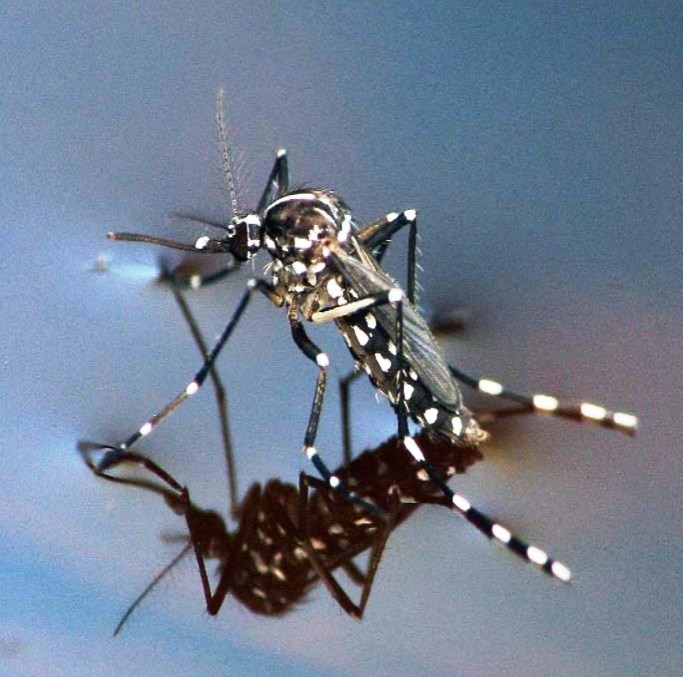
The Asian Tiger Mosquito, Aedes albopictus, one of the two Chikungunya vectors in Florida. Photo by Sean McCann, UF/IFAS Florida Mosquito Database
Chikungunya is a viral disease transmitted to humans by mosquitoes. It is also called “contorted fever” or “that which bends up.” The virus is cycled between mosquitoes and humans, and there is no vaccine against Chikungunya virus. Two species of mosquitoes can transmit Chikungunya virus, and both are present in Florida: Aedes aegypti, also called the Yellow Fever Mosquito, and Aedes albopictus also called the Asian Tiger Mosquito.
An “arbovirus” is any of a group of viruses that are transmitted by mosquitoes, ticks, or other arthropods. The word arbovirus is an acronym of ARthropod-BOrne virus. Other examples of arbovirus include: West Nile virus, Eastern equine encephalitis virus, St. Louis encephalitis virus, and exotic viruses such as dengue virus and chikungunya virus. The Chikungunya virus was first identified during an outbreak in 1952 in southern Tanzania, although it is suspected to have been present in Africa and Asia for much longer. It is now present in hundreds of countries throughout the world, recently including the Caribbean and now Florida. Outbreaks in the Caribbean are already reported at over 300,000 cases just this summer!
2014 Chikungunya Cases in Florida :
- At least 80 IMPORTED cases in Florida (From people who were infected while visiting an area where outbreaks were on-going),
- 2 LOCALLY ACQUIRED cases of Chikungunya (Miami-Dade and Palm Beach Counties) were reported on July 17, 2014. These were the first cases diagnosed in people who had not traveled outside of Florida.
Symptoms of Chikungunya may include:
- Sudden high fever (usually >102º F) which may be continuous or intermittent
- Severe joint pain that commonly involves the hands and feet
- Joint swelling
- Back pain
- Rash usually 2-5 days after fever starts
- Other symptoms may include headache, body ache, nausea, vomiting, and redness around the eyes. In unusual cases, infection can involve the brain, eyes, heart, kidney and other organs.
- Fatal infections are rare, however many patients have chronic joint pain, arthritis, loss of energy and depression lasting weeks to years.
Reduce your exposure to mosquitoes that carry this and other diseases by:
- Reducing their breeding habitat, wearing protective clothing, and applying insect repellant. This UF/IFAS website has a wealth of information on insect repellents: Choosing an Insect Repellant
- Remove mosquito breeding habitat by removing all container sources that can hold water including: bottles, cans, flower pots with saucer bases, clogged gutters, tires, lawn equipment such as wheel barrows, and items that are covered with tarps. Other types of containers can be modified as follows: flush and replace water in bird baths and pet dishes several times a week; cover water collection containers, such as rain barrels, with netting to prevent female mosquitoes from entering to lay eggs.
The Florida Department of Health conducts and compiles a weekly arbovirus surveillance in Florida to monitor populations of endemic mosquito-borne viruses. Their reports can be found here: Florida Arbovirus Surveillance Report. For the most recent report dated click here: Florida Arbovirus Surveillance Week 28: July 6 – July 12, 2014
For more information on this and other arbovirus illnesses please see the following educational resources:
- Florida Department of Health – Chikungunya
- UF/IFAS – Mosquito Information Website
- UF/IFAS – Chikungunya
- Maintaining Dissolved Oxygen Levels in Your Pond to Reduce Fish Kills - September 21, 2018
- The Bumble Bee – One of Florida’s Vital Pollinators - September 14, 2018
- 2017-2018 Bee Informed Partnership’s National Bee Colony Loss Report - July 13, 2018
